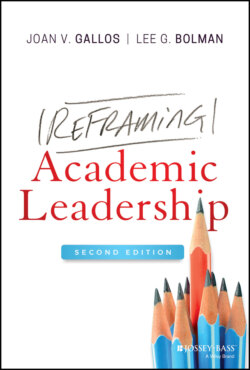Читать книгу Reframing Academic Leadership - Lee G. Bolman - Страница 37
Test Assumptions and Attributions
ОглавлениеWhen others do things we find puzzling or infuriating, the temptation is to attribute unfavorable motives and thoughts to them and then to act on those attributions as if they were true. But none of us is 100 percent accurate in interpreting why others do what they do, and we often make difficult situations worse by operating on the basis of untested attributions. A better alternative is to ask others what they mean, what they intend, or how they are thinking.
In Sarah's performance review with George, for example, she believed George was trying to deflect the conversation away from his performance by his comments on her junior status and comparative inexperience. Sarah never mentioned this to George, but she got angry and began to pound harder (and louder) on him. As an alternative, Sarah might have surfaced her assumption with something like, “George, do you want to discuss my performance or yours?” If George is playing a game, as Sarah believes, then her question alerts him. His defensive maneuvers may be so automatic and overlearned that the question might help him see what he is doing. George may want to discuss Sarah's performance, and a confident Sarah would want that feedback. She could ask, “Would you like to discuss your perceptions of me first?” That gives her a chance to model listening to someone else's perceptions and might increase George's perception that she is willing to listen. But it is not a substitute for George's annual review.
Testing assumptions in this way can lead to learning for both Sarah and George. Sarah might learn that she can handle difficult people without being controlled by their aggression or her fears. This is important for us all. It is essential for young professionals and for women and people of color who are more often the brunt of uncivil behavior in higher education classrooms (Goodyear, Reynolds, & Gragg, 2010; Schmidt, 2010a) and other campus work environments (Freyd & Johnson, 2010; Sadler, n.d.; Riger, n.d.; Twale & De Luca, 2008). George may be acting out gender politics or playing an age‐old intellectual game of self‐protection through deflection and sarcasm. He may be unaware that not everyone finds his style charming – and that others who view him as hard to handle might choose to exclude him from events and critical conversations. If no one calls George's game, he'll probably keep on playing it. Sarah's question might help George become more aware of his tactics and of their consequences. A more skilled and confident Sarah might also enable the conversation that she and George really need to have about what is happening for him and why he is not producing at the levels he once did.
